Table of Contents
ToggleIntroduction
Elderberries have been cherished for centuries as a natural remedy, with their use dating back to ancient times. Known for their deep purple hue and rich nutrient profile, these berries have played a pivotal role in traditional medicine across various cultures. Often referred to as the “medicine chest” of nature, the elder tree (Sambucus nigra) was revered for its ability to address a range of ailments, from respiratory infections to skin conditions. Today, elderberry’s legacy lives on, with elderberry tea emerging as one of the most popular and enjoyable ways to harness its wellness benefits.
What is Elderberry Tea?
Elderberry tea is a warm, herbal infusion made by steeping dried or cooked elderberries in hot water. The tea boasts a natural sweetness paired with subtle tangy and earthy notes, making it a favorite among herbal tea enthusiasts. Beyond its pleasant taste, elderberry tea is packed with health-boosting compounds, including vitamins, antioxidants, and immune-enhancing properties. As modern wellness trends emphasize natural and plant-based remedies, elderberry tea has gained widespread popularity as an easy, delicious way to support overall health.
What is Elderberry Tea Used For?
Elderberry tea is celebrated for its versatility in addressing common health concerns. One of its primary uses is as a natural immune booster, especially during flu season or when colds are prevalent. Studies suggest elderberries can reduce the duration and severity of respiratory illnesses, making elderberry tea a go-to remedy when feeling under the weather.
In addition to immune support, elderberry tea is also used to promote skin health. Rich in antioxidants, this herbal tea helps fight free radicals, which can accelerate skin aging. Its natural compounds are thought to promote a youthful glow, reduce inflammation, and support overall skin vitality. Furthermore, elderberry tea is known for its soothing and calming properties, making it an excellent beverage for unwinding and relieving stress.
Is It OK to Drink Elderberry Tea Every Day?
A frequently asked question about elderberry tea is whether it’s safe for daily consumption. For most individuals, the answer is yes—elderberry tea can be safely enjoyed every day. Since the tea is made from dried or cooked elderberries, it doesn’t carry the risks associated with raw elderberries, which can be toxic. Drinking it regularly allows you to benefit from its rich antioxidants, vitamins, and other nutrients that support immunity, digestion, and overall well-being.
However, as with any herbal remedy, moderation is important. While elderberry tea is generally safe, individuals with specific health conditions—such as autoimmune disorders—or those who are pregnant should consult a healthcare provider before incorporating it into their daily routine. This ensures they can enjoy its benefits without any unintended side effects.
What to Expect Next
In the sections that follow, we’ll explore the many benefits of elderberry tea, its potential side effects, and tips for enjoying it both hot and cold. Whether you’re a long-time tea enthusiast or just discovering elderberry for the first time, this guide will equip you with all the information you need to make elderberry tea a part of your wellness journey.
Nutritional Profile of Elderberries
Elderberries are a nutritional powerhouse, packed with essential vitamins, antioxidants, and minerals that support overall health. These small, deep purple berries have a rich concentration of Vitamin C, a key nutrient known for boosting immunity, promoting collagen production, and protecting cells from oxidative stress. Just a single serving of elderberries provides a significant portion of your daily Vitamin C requirement, making them an excellent natural defense against common illnesses like colds and flu.
In addition to Vitamin C, elderberries are a great source of Vitamin A, a nutrient essential for maintaining healthy vision, immune function, and skin health. Vitamin A plays a critical role in supporting skin cell regeneration, helping to keep your skin smooth, hydrated, and glowing. Elderberries also contain potassium, an important mineral that supports heart health, helps regulate blood pressure, and maintains proper fluid balance in the body.
One of the standout qualities of elderberries is their abundance of antioxidants, particularly flavonoids and phenolic acids. These compounds work to combat free radicals in the body, which are responsible for cell damage and premature aging. By neutralizing free radicals, the antioxidants in elderberries can reduce inflammation, support a healthy immune system, and protect the skin from environmental stressors.
Speaking of skin health, elderberry tea is a wonderful way to harness these benefits. The antioxidants in elderberries promote a radiant complexion by reducing the signs of aging, such as fine lines and wrinkles. They also help to calm inflammation and redness, making elderberry tea a soothing choice for those with sensitive or acne-prone skin.
With its nutrient-dense profile, elderberry tea isn’t just a delicious beverage—it’s a natural way to nourish your body from the inside out. Let me know if you’d like more on how to incorporate elderberry tea into your routine!
Immune System Support
Elderberry tea is widely celebrated for its ability to strengthen the immune system, making it a trusted herbal remedy for warding off illnesses and staying healthy year-round. Packed with natural compounds that support immune function, elderberries have been used for centuries to help the body fight infections and recover more quickly from sickness.
One of the key ways elderberry tea boosts immunity is through its high concentration of Vitamin C, a vital nutrient known to enhance the body’s natural defenses. Vitamin C helps stimulate the production of white blood cells, which are crucial for identifying and attacking harmful pathogens. Additionally, elderberries contain flavonoids like quercetin and anthocyanins, which have strong antioxidant and anti-inflammatory properties. These compounds protect the body from oxidative stress and bolster the immune system’s ability to fend off viruses and bacteria.
Elderberry tea is especially effective during cold and flu season. Studies have shown that elderberries may shorten the duration and severity of respiratory infections. For example, research indicates that elderberry extracts can inhibit the replication of certain viruses, providing relief from symptoms like congestion, sore throat, and fever. While the tea itself may not be a cure, its antiviral properties make it an excellent complementary remedy to help your body recover more quickly.
What is elderberry tea used for?
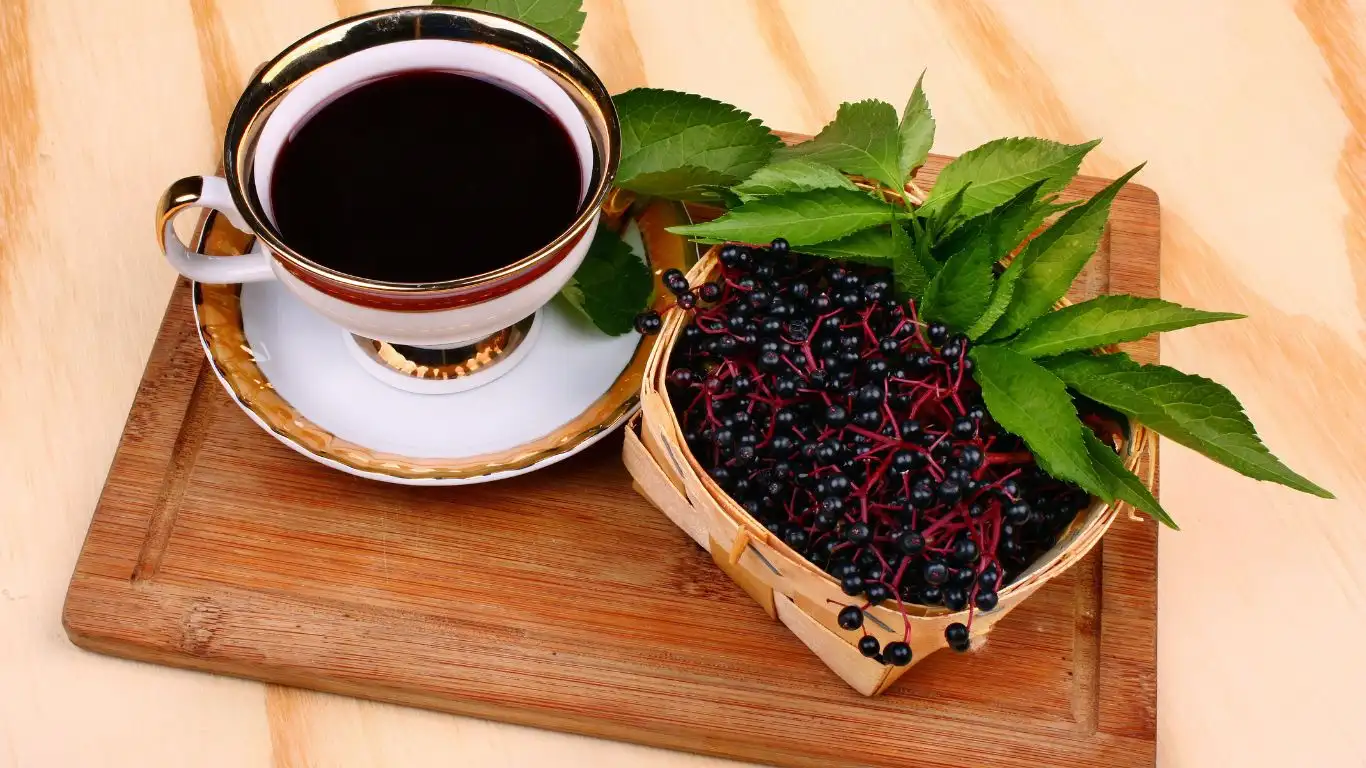
Beyond its comforting warmth and delightful flavor, elderberry tea is a natural ally for immune health. Whether you’re feeling under the weather or looking to prevent illness, a daily cup of elderberry tea can provide consistent immune support. It’s a simple, natural way to stay proactive about your health, particularly during times when your body is more susceptible to infections.
Rich in Antioxidants
Antioxidants are powerful compounds that play a crucial role in protecting the body from oxidative stress, a process that occurs when harmful molecules called free radicals damage cells. Over time, oxidative stress can contribute to aging, inflammation, and chronic illnesses such as heart disease and cancer. Elderberries, the star ingredient of elderberry tea, are rich in antioxidants like flavonoids, anthocyanins, and phenolic acids, making this herbal tea an excellent choice for supporting your body’s natural defense system.
The high antioxidant content in elderberry tea does more than just shield your cells from damage—it also offers remarkable benefits for your skin. Free radicals are one of the main culprits behind premature aging, causing issues such as wrinkles, fine lines, and dullness. By neutralizing these free radicals, the antioxidants in elderberries help preserve your skin’s elasticity, giving it a firmer and more youthful appearance.
Anthocyanins, the pigments that give elderberries their deep purple color, are particularly beneficial for skin health. They promote healthy circulation, which helps deliver oxygen and nutrients to your skin cells. This improved blood flow can enhance your skin’s natural glow, leaving you with a radiant complexion. Additionally, elderberry tea contains Vitamin A, another skin-friendly nutrient that aids in cell regeneration and reduces inflammation, helping to calm redness and soothe irritated skin.
Incorporating elderberry tea into your routine is a simple, natural way to nourish your skin from within. Whether you’re looking to combat signs of aging, improve your skin’s texture, or boost its natural vibrancy, the antioxidants in elderberry tea offer an array of benefits to help you achieve healthier, more radiant skin.
Anti-Inflammatory Properties
Inflammation is the body’s natural response to injury or infection, but chronic inflammation can lead to a host of health issues, including arthritis, heart disease, and autoimmune disorders. Elderberry tea is gaining recognition as a natural remedy for reducing inflammation, thanks to its abundance of plant-based compounds with anti-inflammatory properties.
Elderberries are rich in flavonoids, particularly anthocyanins, which have been shown to combat inflammation at a cellular level. These compounds work by reducing the production of pro-inflammatory cytokines, molecules that contribute to pain, swelling, and tissue damage in the body. As a result, drinking elderberry tea regularly may help alleviate symptoms associated with inflammatory conditions such as arthritis, joint pain, and muscle stiffness. For individuals dealing with these issues, elderberry tea can be a comforting, natural way to promote better mobility and reduce discomfort.
Additionally, elderberry tea’s anti-inflammatory properties extend to improving overall well-being. Chronic inflammation is linked to fatigue, digestive problems, and even mental health challenges like anxiety and depression. By soothing inflammation, elderberry tea supports a more balanced and harmonious state within the body, contributing to enhanced vitality and resilience.
One common question is whether it’s safe to drink elderberry tea daily for managing inflammation. The answer is generally yes, as long as the tea is made from properly dried or cooked elderberries to eliminate any toxins. Regular consumption can provide a steady source of antioxidants and nutrients that keep inflammation in check. However, it’s always wise to consult a healthcare professional, especially for individuals with autoimmune disorders or other health conditions, to ensure elderberry tea is a good fit for their specific needs.
Respiratory Health Benefits
Elderberry tea is a time-honored remedy for supporting respiratory health, particularly during the colder months when colds, coughs, and sore throats are common. Its natural properties make it a soothing and effective way to ease discomfort and promote faster recovery.
One of the key reasons elderberry tea is so beneficial for the respiratory system lies in its antiviral and anti-inflammatory properties. Elderberries contain compounds that may inhibit the replication of certain viruses, helping to reduce the severity and duration of colds and flu. If you’re dealing with a scratchy throat or persistent cough, a warm cup of elderberry tea can help soothe irritation and provide relief. Its warm steam can also help open nasal passages, making it easier to breathe when you’re congested.
Beyond colds and flu, elderberry tea’s calming effect on inflammation makes it a gentle aid for other respiratory issues, such as allergies or mild asthma. By reducing swelling in the airways, it supports easier, more comfortable breathing. For many, elderberry tea is a comforting addition to their wellness routine, particularly when symptoms of respiratory distress arise.
When it comes to how to enjoy elderberry tea—hot or cold—it largely depends on your purpose. If you’re trying to alleviate cold symptoms, a hot cup of elderberry tea is ideal. The warmth not only soothes the throat but also enhances circulation and helps you relax. On the other hand, if you’re looking for a refreshing, immune-boosting beverage on a hot day, a chilled version of elderberry tea is just as effective at delivering its health benefits.
Whether you’re fighting off a cold or simply enjoying it as a daily wellness practice, elderberry tea is a natural, versatile way to care for your respiratory health.
Digestive Support
Elderberry tea is not only beneficial for the immune system but also plays a supportive role in promoting healthy digestion. The natural compounds found in elderberries, such as fiber and antioxidants, help maintain a balanced and functioning digestive system.
One of the key ways elderberry tea supports digestion is through its dietary fiber content. Fiber is essential for gut health as it helps to regulate bowel movements and ensures smooth digestion. It also plays a role in maintaining a healthy gut microbiome, which is crucial for overall digestive function. Regular consumption of elderberry tea can help prevent constipation and promote regularity by encouraging the movement of food and waste through the digestive tract.
Additionally, elderberry tea can help reduce bloating and discomfort caused by digestive issues. The anti-inflammatory properties of elderberries may soothe the digestive system, alleviating feelings of fullness, gas, and abdominal pressure.
If you’re looking for a natural way to support your digestion, sipping on elderberry tea can provide gentle relief and improve your overall gut health. It’s a great addition to your daily routine, especially if you struggle with digestive discomfort or bloating.
Stress Relief and Relaxation
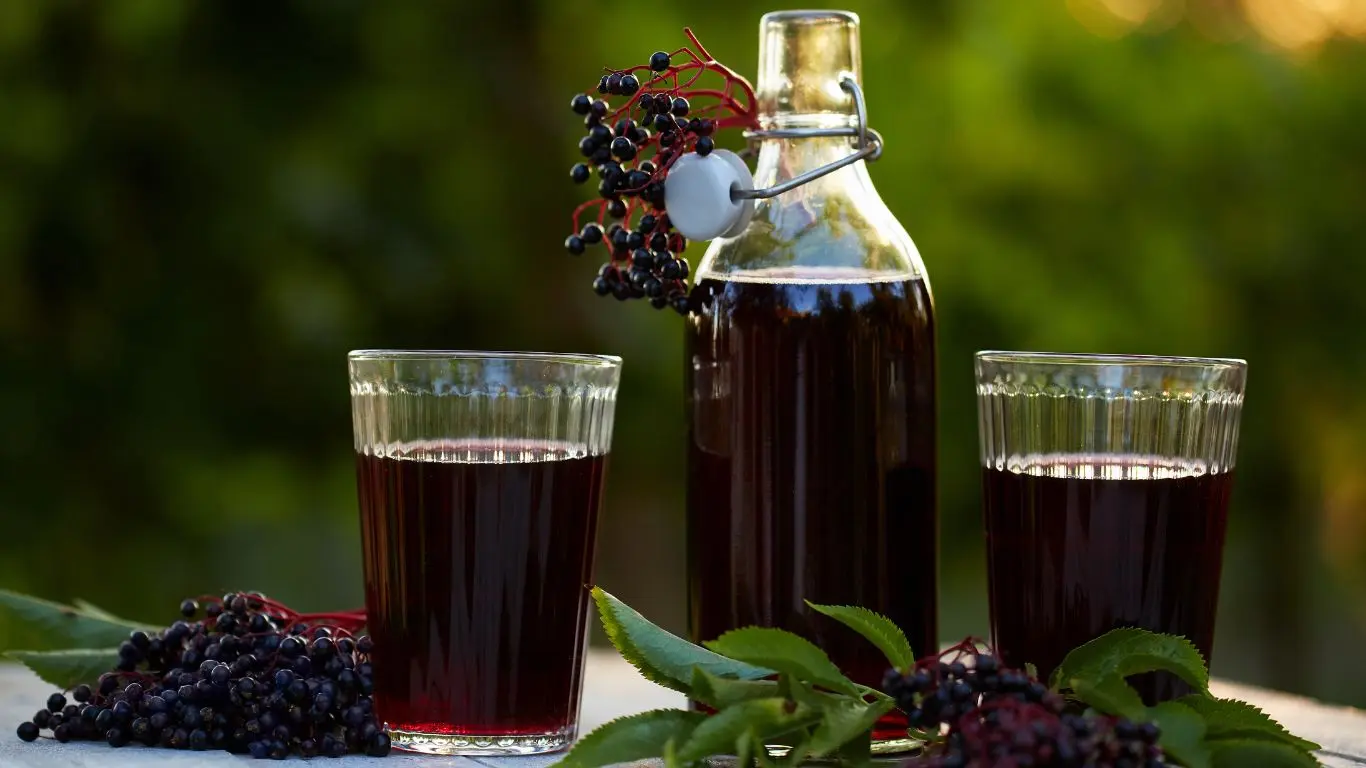
In today’s fast-paced world, stress has become an inevitable part of life. However, finding natural ways to unwind and relax is essential for maintaining both mental and physical health. Elderberry tea, with its calming properties, is a wonderful addition to any stress-relief routine, helping to soothe the mind and body after a long, hectic day.
One of the key reasons elderberry tea is so effective at promoting relaxation is due to its anti-inflammatory and antioxidant content. While these compounds primarily support physical health, they also contribute to mental well-being by reducing inflammation and promoting a sense of calm. The gentle, natural sweetness of elderberry tea also offers a comforting ritual, allowing you to slow down, take a deep breath, and truly unwind.
Elderberry tea can be easily incorporated into your daily stress-relief routine. Consider enjoying a warm cup of elderberry tea in the evening, just before bed. The act of sipping a soothing beverage in a peaceful environment signals to your body that it’s time to relax and wind down for the night. Additionally, elderberry’s natural compounds may help to calm an overactive mind, making it easier to sleep and reducing feelings of anxiety.
Drinking elderberry tea every day can have cumulative effects on your relaxation and stress levels. By incorporating this calming beverage into your routine, you’ll not only experience immediate relief but also benefit from its long-term effects on your overall well-being. The consistency of this daily ritual can contribute to a calmer, more balanced mindset.
Whether you’re dealing with daily stress or simply seeking a moment of calm, elderberry tea is a simple yet powerful way to support your mental and emotional health.
Precautions and Potential Side Effects
While elderberry tea is generally safe for most people and offers numerous health benefits, it’s important to be aware of potential side effects and precautions to ensure that it’s consumed safely. By understanding these, you can maximize the benefits of elderberry tea while minimizing any risk of discomfort or harm.
What Are the Side Effects of Black Elderberry Tea?
For most individuals, elderberry tea is well-tolerated, but there are a few potential side effects to be aware of. Some people may experience mild digestive upset, especially if they drink too much elderberry tea at once. This can manifest as stomach cramps, nausea, or diarrhea. If you notice any digestive discomfort, it’s advisable to reduce your intake or consult a healthcare provider to determine whether elderberry tea is the right choice for you.
Additionally, though rare, some individuals may experience allergic reactions to elderberries. Symptoms can include itching, rash, or swelling, especially if you are allergic to other berries or plants in the same family (e.g., honeysuckle or elderflower). If you notice any unusual reactions, it’s important to stop drinking the tea and seek medical advice.
Who Should Not Drink Elderberry Tea?
Certain groups of people should avoid elderberry tea or consult with a healthcare provider before drinking it regularly. Pregnant women, for example, should avoid elderberry tea, as it can stimulate uterine contractions and may pose a risk to pregnancy. Similarly, breastfeeding mothers should exercise caution, as the effects of elderberry on breastfeeding are not well-studied.
Individuals with autoimmune diseases, such as rheumatoid arthritis, lupus, or multiple sclerosis, should also be cautious. Elderberries contain compounds that may stimulate the immune system, which could potentially exacerbate symptoms of autoimmune conditions. If you have an autoimmune disease, it’s best to speak with a doctor before adding elderberry tea to your routine.
Preparing Elderberry Tea Safely
One of the most important precautions when drinking elderberry tea is ensuring that it’s prepared properly. Raw or unripe elderberries contain toxic compounds called sambunigrin, which can cause nausea, vomiting, and even more serious symptoms if ingested in large amounts. However, when elderberries are cooked or dried, these toxic compounds are neutralized, making the tea safe to drink. Always ensure that you’re using properly prepared elderberries—whether dried, cooked, or commercially processed—when making elderberry tea.
It’s also a good idea to follow recommended dosage guidelines to avoid overconsumption. While elderberry tea is generally safe when consumed in moderation, excessive intake can lead to digestive upset or other unwanted effects.
Conclusion
Elderberry tea is much more than just a soothing herbal beverage—it’s a natural powerhouse packed with benefits for your body and mind. From its ability to boost your immune system and protect your skin to its potential for promoting relaxation and heart health, elderberry tea offers a holistic approach to wellness.
One of its standout benefits is its immune-boosting properties, making it a reliable ally during cold and flu season. The tea’s antioxidants and vitamins, particularly Vitamin C and anthocyanins, work together to fortify your body’s defenses, helping you recover faster and stay healthier. Additionally, the rich antioxidants in elderberries make c tea great for skin health. By combating free radicals, this tea can enhance skin elasticity, reduce signs of aging, and leave you with a natural, radiant glow.
For those seeking moments of calm amid life’s stresses, elderberry tea is an excellent addition to a stress-relief routine. Whether you enjoy it hot before bedtime to unwind or cold as a refreshing afternoon pick-me-up, elderberry tea is a versatile way to relax while nourishing your body.
One common question is, “Is it OK to drink elderberry tea every day?” For most people, the answer is yes—daily consumption of elderberry tea can provide consistent support for your immune system, skin, and overall well-being. However, it’s important to ensure the tea is prepared correctly and consumed in moderation. As with any herbal remedy, consulting a healthcare provider is wise, especially if you’re pregnant, breastfeeding, or have specific medical conditions.
We encourage you to give elderberry tea a try, whether you’re new to herbal teas or looking to expand your collection. The gentle, slightly sweet flavor makes it a comforting and enjoyable addition to your wellness routine. Whether sipped warm on a cold evening or enjoyed chilled during the summer, elderberry tea is as versatile as it is beneficial.
Have you tried elderberry tea before? We’d love to hear about your experiences! Share how it has benefited you, or let us know your thoughts on drinking elderberry tea every day. Your insights may inspire others to incorporate this incredible herbal tea into their lives.


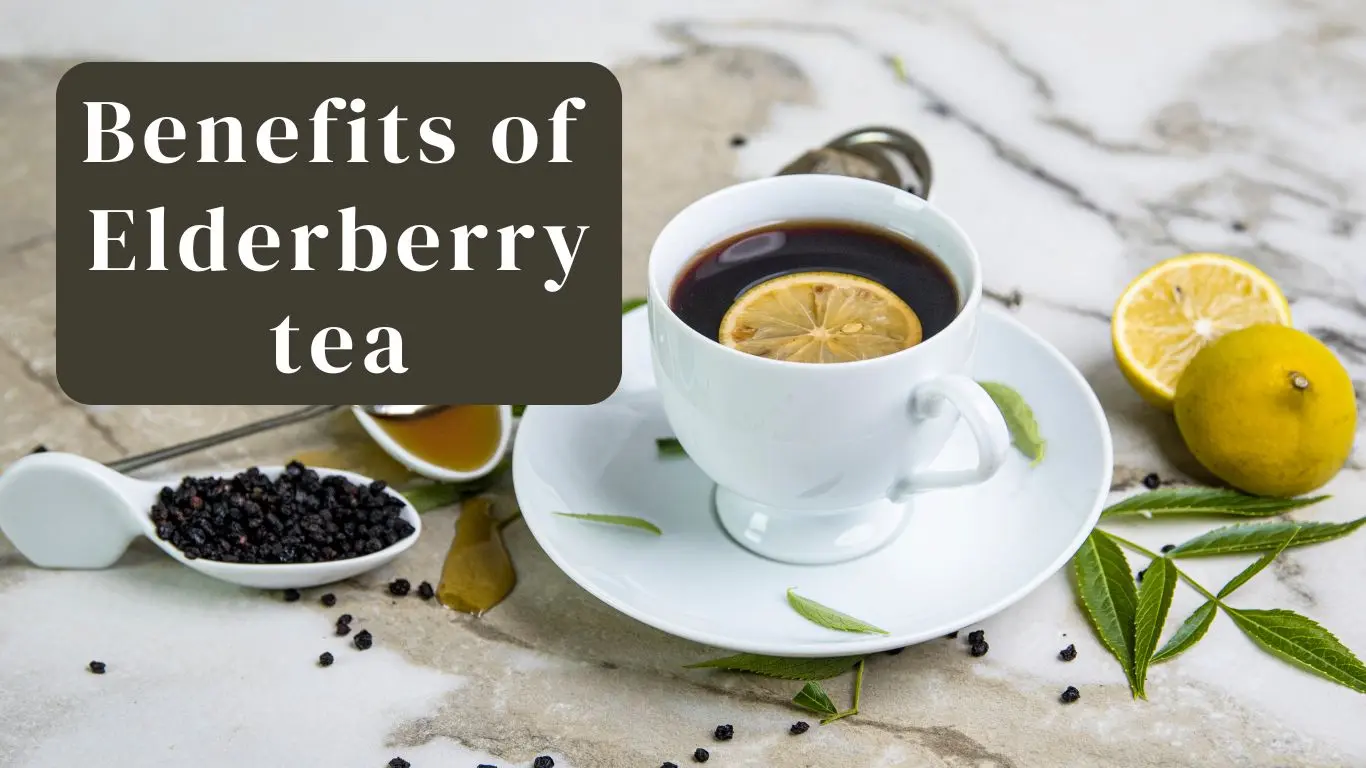

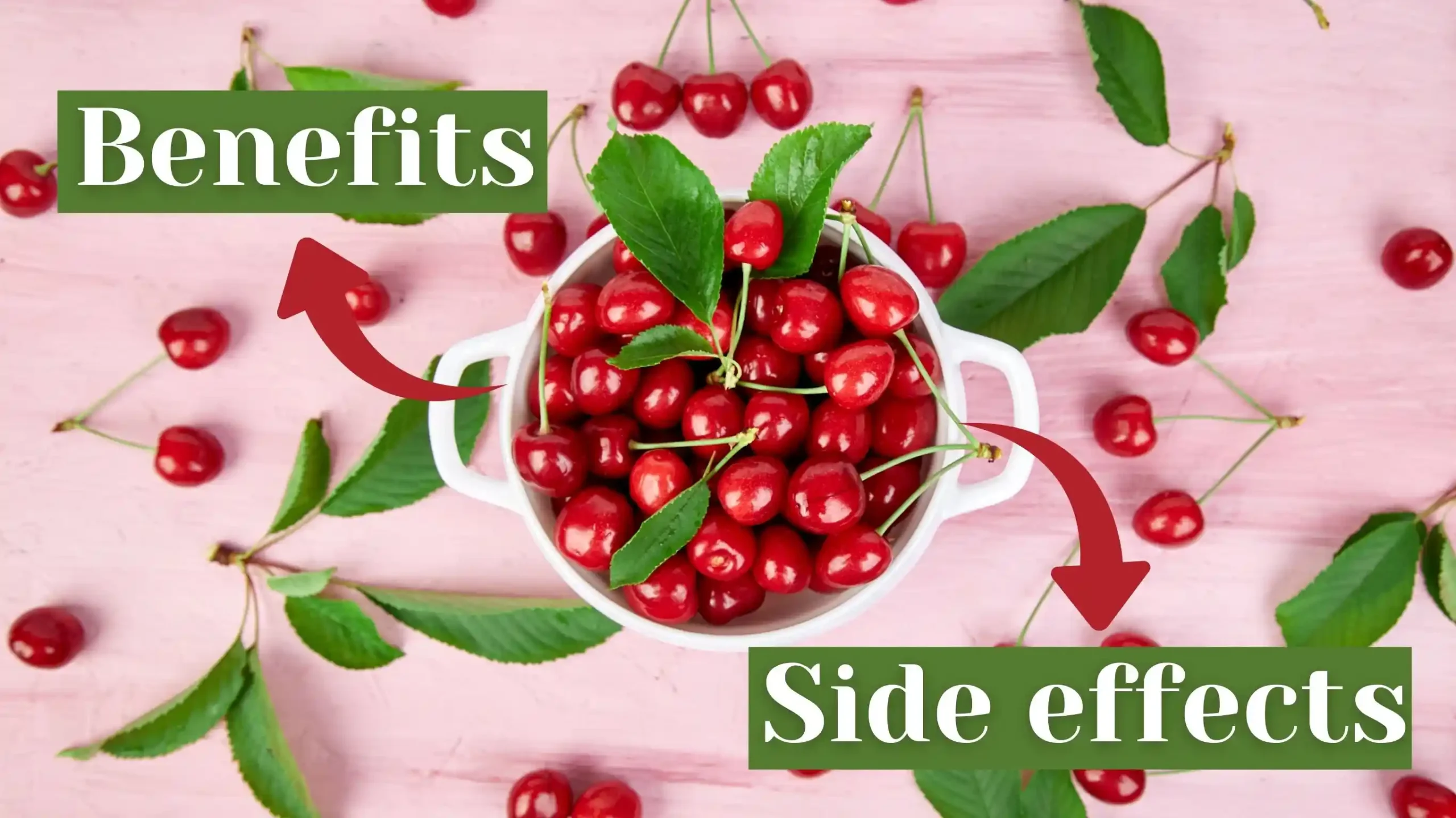
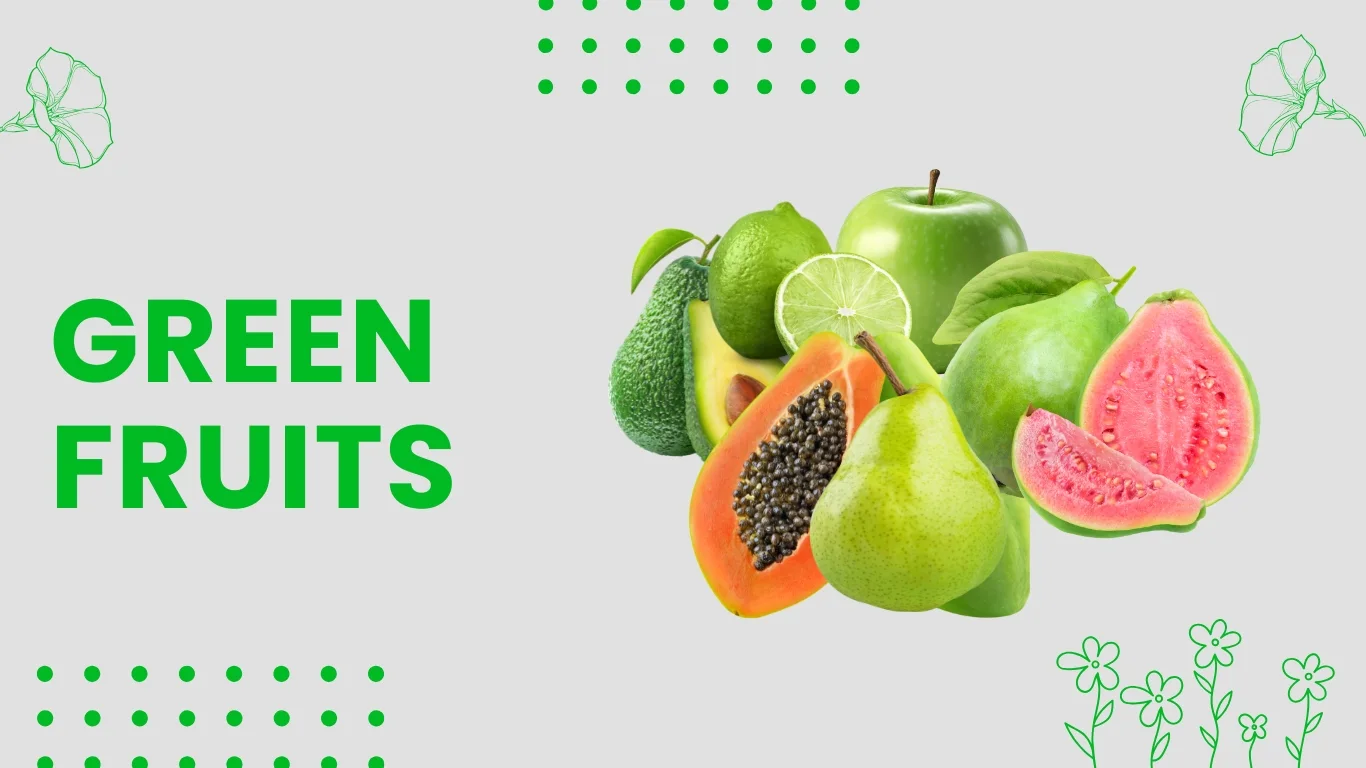
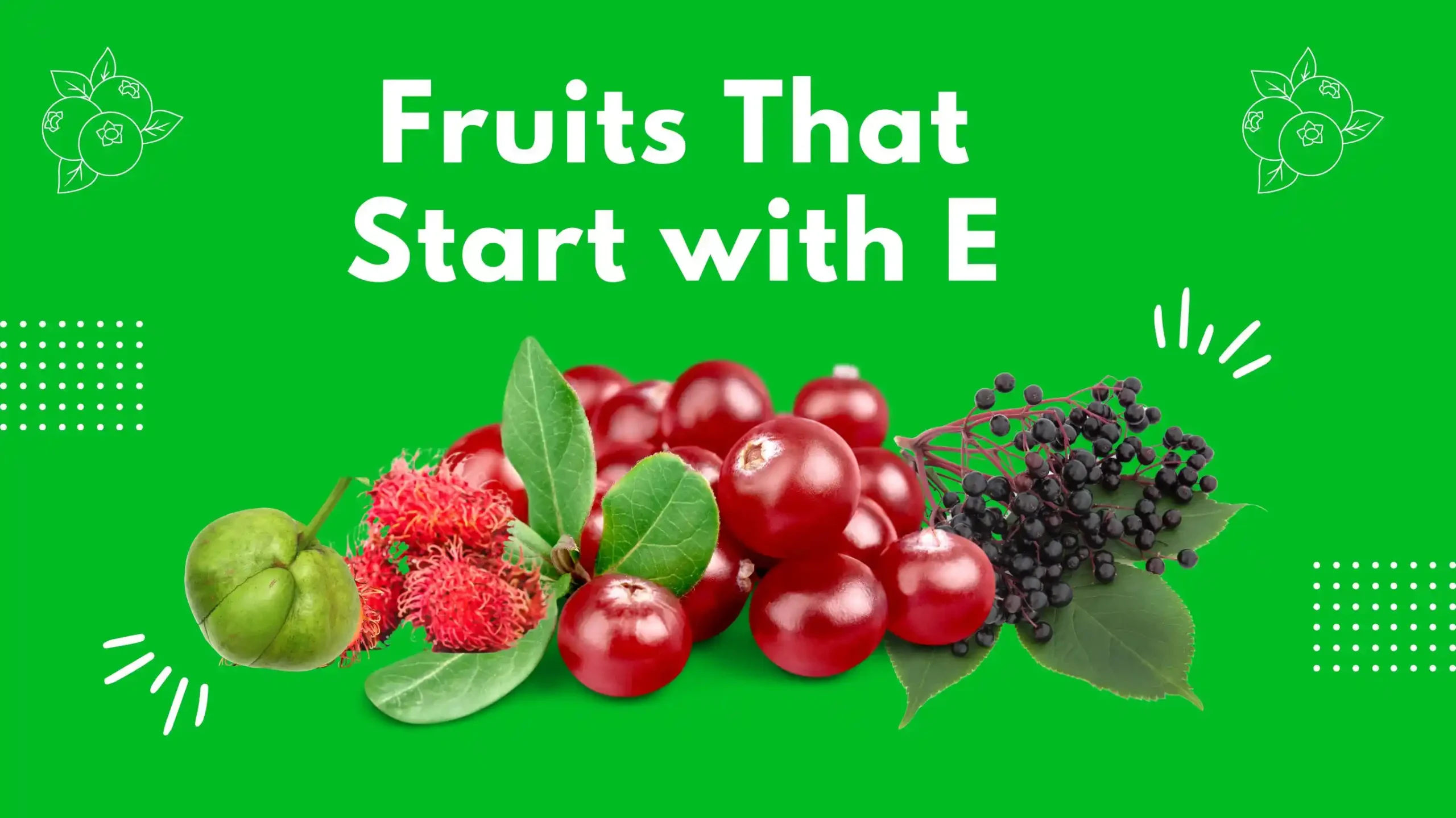
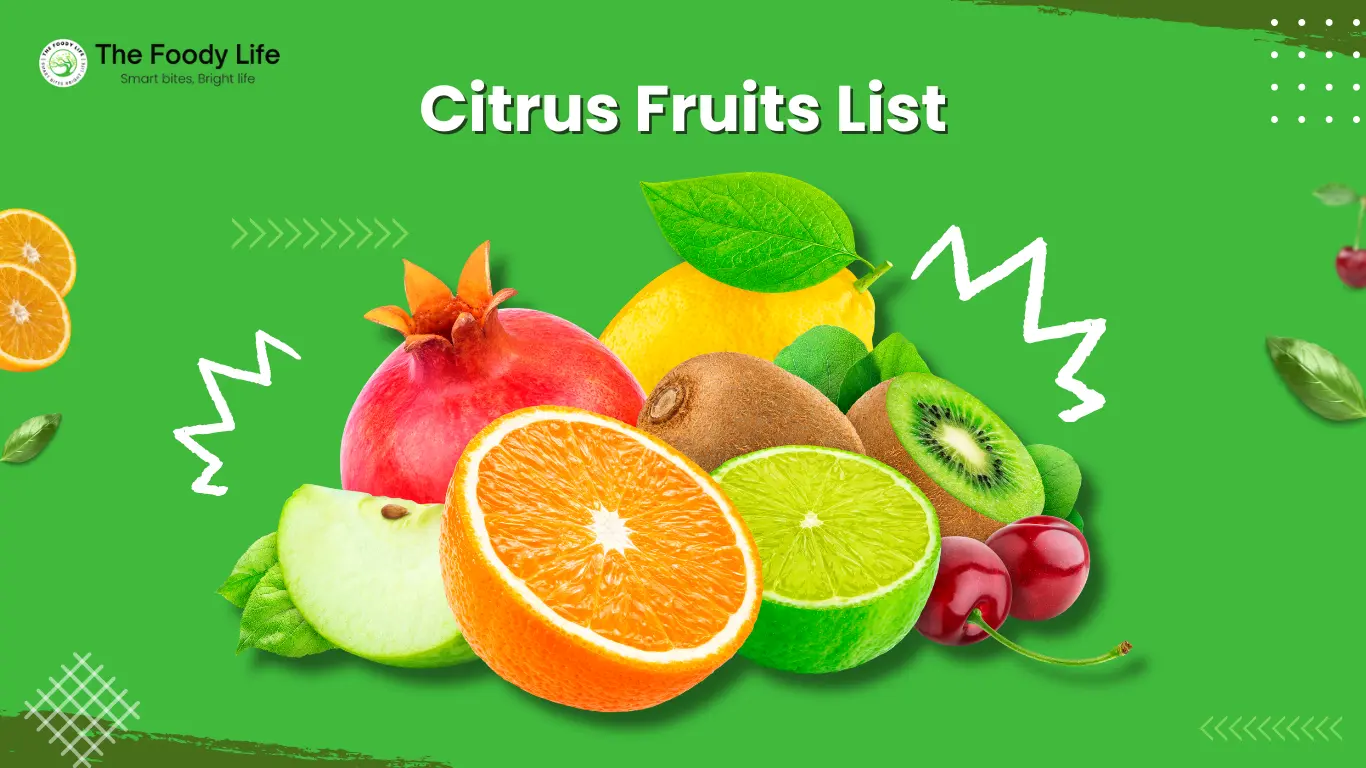

1 thought on “What are the benefits of drinking elderberry tea?”
helloI really like your writing so a lot share we keep up a correspondence extra approximately your post on AOL I need an expert in this house to unravel my problem May be that is you Taking a look ahead to see you HABANERO88